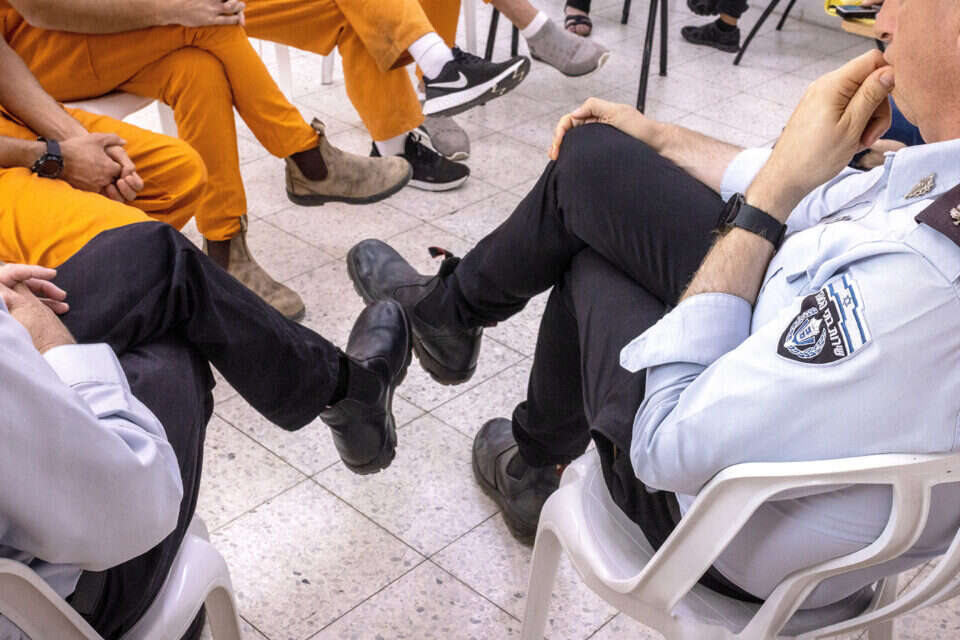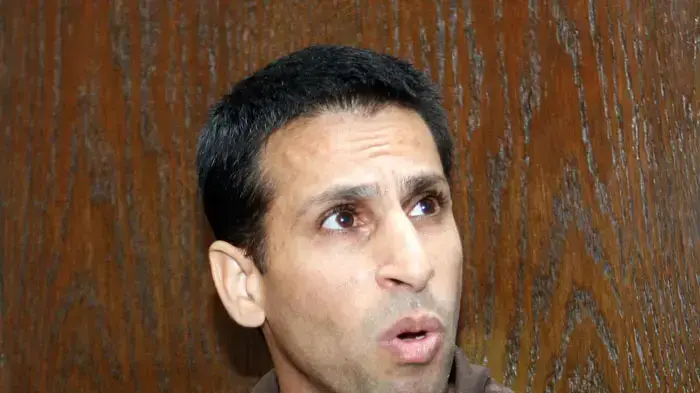"It's not your fault that I used you for my feelings, it's not your fault that I took advantage of your closeness to me. It's not your fault that you believed in me and trusted me, it's not your fault that I broke your mom and dad's trust. You're not to blame for the movies and content I've shown you, you're not guilty of cheap manipulation.
"It's not your fault that you carried an ugly secret with you in front of the whole world, it's not your fault that I took advantage of your youthful confusion. You're not guilty of looking for excitement and attitude, you're not guilty of robbing you of good years. It's not your fault that I was a weak coward and superhero, it's not your fault that I didn't have the courage to face myself. It's not your fault that I lied to everyone that it's just a family relationship, it's not your fault that it will take you years to heal, if at all."
These sentences were written by Meir (not his real name), who was sentenced to four years in prison after committing indecent acts and unlawful acts against his family member. They were taken from a personal diary he wrote a few months ago, which he hid from his caregivers in prison and from the prisoners beside him.
Now Meir reveals for the first time the insights he documented. "The message in the words is for my victim, even though she will never read it, because I am not allowed to contact her," he places the open page on his lap. "The headline is 'You're not guilty,' because I know that one of the most difficult struggles victims face is the tendency to take responsibility for the assault. It's important to me that my victim knows that it's not her fault. This is me. We, the prisoners here, behaved like predators, ignored the feelings of the victims, thought only of ourselves and gave in to our instincts."
How many will come back to hurt?
The issue of the place of sex offenders in Israeli society comes up again and again every time the issue makes headlines, as in the heartbreaking case of Yael Greenberg, the rape victim from Kibbutz Shomrat, who passed away last month from an illness after years of mental and economic distress, and the frustration she felt with the ridiculous punishments the rapists received. The question is weighty: Should sex offenders be ostracized and condemned forever, or should they be rehabilitated so that they can be released from prison as normal citizens capable of controlling their creations?
The officials dealing with the Prison Service have no doubt about the answer: since every prisoner will be released and eventually released, it is better that he do so after receiving initial treatment in prison, otherwise he will repeat his actions – and the main victim will be the public. The IPS backs up the finding with surprising data, according to which only about 1 per cent of released prisoners who received treatment return to commit sexual offenses during the five years after release, compared to about 5 per cent of sex offenders who refused treatment.
To illustrate this figure in numbers, we note that there are currently 1,013 sex offenders incarcerated in Israel, of whom 152 are defined as high risk to the public. The difference between 1% of repeat offenders ("recidivists" in professional jargon) and 5% is 41 offenders. In other words, 41 cases in which as a result of the treatment, re-harm to women, boys and children will be spared.
Meeting of sex offenders in group therapy. "We hear difficult stories about impulses that the patient does not understand and does not know how to control," Photo: Arik Sultan
In a rare move, four inmates currently being treated in a sex offender group agreed to talk about the lengthy treatment they attend. The conversation with them is not intended to legitimize or offer understanding for the despicable acts they committed, which affect the lives of their victims every day, but rather to provide a glimpse into the mental processes they undergo as part of the treatment - including regret, internalization and sorrow, along with preparing for what awaits them the day after their release from prison.
"When I internalized what I had done, all I saw was that I was a human monster unworthy of existence, and that I deserved a death sentence," says one. "It took me quite a while in the group to emphasize the good that will overcome the bad, and to want to bring good to the world."
"The conversations started trickling down"
Within Israel's prisons, there are various treatment groups, some of them specialized, such as the group for the treatment of sex offenders. Others are intended for all prisoners, such as anger control or life skills. There are currently about 160 prisoners in the sex offender treatment groups that receive intensive daily treatment, lasting between a year and a half and two years. The rest of the prisoners who are interested in treatment wait until space becomes available, and in the meantime participate in other groups. According to the data, only about 8 per cent of all sex offenders in prison refuse to undergo any treatment until the day of release.
"The dedicated group therapy makes it possible to treat prisoners in several areas simultaneously, in order to reduce their dangerousness, and is designed to help them identify and cope with risk situations in the future, while understanding their patterns of vulnerability in the past," says Prison Superintendent Yiftach Ben Nahum, head of the treatment of sex offenders at the IPS.
"Working with them is done on the behavioral, cognitive, emotional and interpersonal levels, and focuses on relationship problems, poor self-regulation, sexual deviation, etc. In the group, they acquire tools that include increasing empathy for the victim, refuting distorted perceptions, coping with complex emotions, managing sexual urges and conflicts, and leading a balanced and satisfying lifestyle."
We are making our way with Ben Nahum to Ward 4 of Ma'asiahu Prison, which houses only sex offenders. The paths are winding and surrounded by touch-sensitive electronic fences. The entrance to the compound is ascetic compared to the other wings: a small plaza with three wooden picnic tables, and opposite them more than ten plastic laundry racks, stand in perfect order and filled with clothes. Not far from them are three orphaned fitness facilities, like those in public parks.
Rabbi Ben Nahum, Photo: Arik Sultan
Participants in the sex offender group are greeted by a sign hanging above the door of the room: "Learning from the past, coping with the present, hoping for the future." Inside, the four prisoners wait, sitting on white plastic chairs and wearing orange uniforms. They look embarrassed and cramped, aware of the public's disgust at the dubious title that will accompany them for the rest of their lives - "sex offenders."
Prisoner Yiftach Ben Nahum: "It's a gradual process, and every prisoner goes through it at his own pace. Our therapists have been trained, and they know how to get prisoners to cooperate voluntarily, in a therapeutic environment that offers confidentiality, boundaries, humane treatment and a listening ear."
The four present themselves without attempting to downplay the seriousness of the offense they committed. It should be noted here that in order not to expose the victims or cause them further trauma, the four appear in the article under pseudonyms. All had no prior criminal record until their current incarceration.
Meir, 34, is serving a three-year prison sentence and awaits another year after being convicted of indecent assault and unlawful assault on a family member. Guy (29) is due to be released in three months, after being imprisoned a year ago following his confession to committing indecent acts against minors and possession of obscene materials. Noam (33) was convicted of rape of a woman, false imprisonment, indecent assault and sexual harassment, and has been involved in his actions for about three years and is due to face a parole board soon, after having six months left. The oldest of the four is Benzi, 42, who was sentenced to ten years in prison for raping and sodomizing and indecent assault on a 17-year-old girl. In three years, he is expected to be released.
The initial motivation that pushed Noam to want to participate in the group was egotistical. "As soon as I went to prison, I thought about how I don't come back here anymore," he immediately admits honestly. "They took away my freedom, and I believed I hadn't done anything wrong. My initial goal was to gain two things: to justify my actions and to precede my release. I didn't see myself as a rapist or sex offender, because at that initial stage I couldn't see the other, only myself. For me, a woman was an object, a sexual object."
Benzi: "I also thought like Noam at first. I wanted to finish the punishment as quickly as possible – and get out. I didn't understand why they sent me to prison after I confessed to the crimes, and I didn't understand why they were talking to me about rape because of sex with a minor. To me, rape was catching a girl in the dark in a public park or alley. As far as I'm concerned, I didn't do anything wrong."
How long did you sit before you decided to join the group?
Benzi: "For the first year and a half I was in another prison, where there was no group for sex offenders. The social workers tried to talk to me, but the only answer I gave was that I was the victim here. Prison didn't scare me – and that's dangerous. A person who is not afraid of prison is prone to calamity, and has no problem returning here again and again. In prisons there is a kind of comfort. There is food, a place to sleep, medical treatments and even work. You don't have to strain on anything. I was impervious to my emotions and what I was going through.
"Over time, the individual conversations with social workers began to seep in, and I couldn't help but think about what I had done. At some point, I realized that the young woman had not consented to the sexual relationship, and that I had done it under duress. That's when I asked to move from there to his actions, even though I'm less comfortable here, just because there's a dedicated group here. In the previous prison, I was one of them all, and I didn't tell them what I was sitting on. Here I am in a wing designated for sex offenders. There is no doubt here what I did."
Guy, when did you decide to join the group?
"First of all, I also admit that the initial consent to take part in any treatment was selfishly motivated. For me, it started during the criminal trial, on the recommendation of the probation service, and I saw the treatment option as a source of reduced sentence, and maybe even an option to evade imprisonment, in the hope that I would be given community service."
Benzi reinforces him: "It's natural. I'm sure most of the prisoners in the groups do this, but the most important thing is the result, because when you're inside, you get sucked in and begin to internalize the offenses you committed. This is the first step towards healing."
Guy: "That was the initial motivation, but it didn't affect the court's decision. Even though I started individual therapy while I was under house arrest, the judge decided I would go to prison. The truth is that I don't know anyone who has committed a serious offense and is not serving a prison sentence. And that's a good thing."
"I was looking for excuses for my actions"
It is impossible to sit in front of prisoners of sexual offenses without feeling reluctant and thinking about the women who were harmed, about the children who did not understand why their bodies were being touched. All four of them are intelligent, had successful careers, nurtured relationships and fathered children. The most disturbing questions are to what extent these prisoners have truly internalized the gravity of the despicable acts they committed, whether the remorse they express is sincere, and if after release none of them will again succumb to problematic sexual impulses and distortions of thought.
Meir: "I understood the magnitude of the harm caused to her during the legal process. I was under house arrest with electronic handcuffs at the time, and I began initial treatment from the probation service of the Ministry of Social Affairs. I hoped that if I was conducting the trial while I was at home, I might not end up in jail – but I was wrong. I came in here angry, because I also thought that the initial treatment would lead me to community service only. I was here all the time on the defensive. I was among regular prisoners, and I knew that a sex offender was the most inferior, so I was mostly busy justifying myself."
Meir does not forget his first meeting in prison with a social worker. "I waited in the yard and circled around myself looking for excuses. My mind wasn't free to think about the hurt I'd caused the family member. At one point I joined a psychoeducational group that gives thinking skills and talks about sexuality, but it was hard for me to be exposed. All I wanted to do was finish my sentence and go home."
What convinced you to enter a sex offender treatment group after all?
Meir: "The first taste, like most other prisoners, was egotistical, because I understood that this way you can be released on a third. On the other hand, the personal conversations with the social worker began to have an effect. I understood what I had done and how much damage I had caused. She convinced me to join the group, and I'm not sorry - even though it wasn't easy. I didn't want to repeat such acts again.
"When you get to Ward 4, you're basically declaring with a committee that you're a sex offender. Until then, I hid what I had done and told them I was sitting on domestic violence. Today I no longer care not to let go on a third, and I don't try to make it easier for myself. Every day I'm on the team is a blessing for me and my environment."
Meir: "I'm not sorry I joined the group, but it wasn't easy for me. When you're in Ward 4, you're basically declaring yourself a sex offender. Before that, I hid. Today I don't try to make it easy on myself. Every day I'm on the team is a blessing for me and my environment."
What did you discover about yourself that you didn't know before?
מאיר: "שבעצם הייתי חסר ביטחון. זה ליווה אותי בעסקים, וגם בהתנהלות מול הסביבה".
בנצי: "אני למדתי לחשוב ולקבל אחריות על המעשים שלי. הפסקתי להיות אטום וגיליתי את הרגשות. כמו כן, לצד הביקורת הפנימית, למדתי גם לפרגן לעצמי. יש בי גם דברים טובים".
עד כמה אתם חושבים על הקורבנות שלכם?
גיא: "זה חלק מהטיפול כאן, ומשהו שאנחנו חווים ביום־יום. אנחנו הרי נמצאים כאן בגלל זה, בגלל
הפגיעה בקורבנות".
נועם: "זה לא מרפה. אתה קם עם זה והולך לישון עם זה. את יודעת מה? אני אעמוד בקרוב בפני ועדת שחרורים, וזה בסדר אם היא תקבל את העמדה של הקורבן שלי. מגיע לי העונש שלי, ואני מוכן להיות כאן עד ליום האחרון כדי לצאת מכאן אדם טוב יותר".
בנצי: "חשוב לי להיות כן, ולכן אני אומר שהאמפתיה לקורבן מגיעה בשלב מאוחר יותר בקבוצה. זה תהליך. מי שאומר אחרת משקר, והוא נמצא בקבוצה רק כדי להשתחרר מוקדם".
מותר לכם להתנצל בפני הקורבנות?
נועם: "אסור לנו ליצור איתם קשר".
מאיר: "זו הסיבה שכתבתי את המכתב. אולי בעתיד, מי יודע, היא תרצה לקרוא אותו".
אתם רוצים בכלל להתנצל?
גיא: "כולם פה רוצים. בטח מי שנמצא בקבוצות".
גיא: "אחרי השחרור שלי מצפה לי בעיה בזוגיות ובפרנסה. למקצוע שלי לא אוכל לחזור לעולם, כי לא יהיה מי שיעסיק אותי. העבירות שעברתי והישיבה בכלא הן חלק ממי שאני, וזה המצב. זה חלק משמעותי בחיים שלי"
נועם: "לי יש רצון לפצות בצורה כלשהי. כל מה שיקל על הקורבן".
בנצי מתפרץ לדבריו: "אני לא מתחבר למה שאמרת עכשיו. אתה חושב שכסף יעזור? כסף לא יהפוך את הפגיעה לפחות עוצמתית".
נועם: "מי דיבר על כסף? אמרתי שהייתי שמח אם יכולתי לעשות משהו כדי שהיא תרגיש יותר טוב".
בנצי: "אתה רוצה שהן ירגישו יותר טוב עם עצמן כדי שאתה תרגיש יותר טוב עם עצמך".
נועם לא מוותר: "אמרתי שאני מוכן לרצות כאן את כל העונש, בלי ועדת שחרורים, רק כדי שהיא תרגיש טוב".
הערכת מסוכנות מינית
כשיגיע יום השחרור של מאיר, גיא, בנצי ונועם, כמו של שאר עברייני המין במדינה, הם לא ישובו לשגרת חיים אנונימית. הם יעברו שיקום נוסף מטעם הרשות להגנת האסיר, ובמקביל יהיו תחת מעקב גלוי וסמוי של יחידת צור, השייכת לשב"ס. תפקידה של היחידה הוא לאתר, לסכל כוונות ולהגן על הציבור מפני עברייני מין המנסים לחזור על מעשיהם או לבצע עבירות פליליות אחרות. הפיקוח כולל מעקבים, תצפיות, ביקורי פתע, חיפושים במרחב הווירטואלי ועוד. יותר מ־70% ממפוקחי צור ריצו מאסר על פגיעה בקטינים.
בנצי: "ידעתי שאני עושה משהו לא תקין - אבל זה לא הזיז לי. לא חשבתי על ההשלכות על הצד השני. היום אני לא אוהב שנותנים הצדקות כמו 'נפגעתי בעצמי כשהייתי ילד', או 'הייתי תחת השפעת אלכוהול'. אלו תירוצים. פגענו - ונתמודד"
"היחידה היא המפתח והסיבה לכך שרוב עברייני המין לא חוזרים שוב לכלא, גם אלה שלא השתתפו בקבוצות", מסביר סגן־גונדר ד"ר רוברט אפשטיין, ראש ענף פסיכולוגיה בשב"ס. "ההשפעה שלה היא משמעותית".
אם ההרתעה שלה כל כך רבה, למה להשקיע זמן ומשאבים בטיפול בקבוצה שנמשך כשנתיים?
ד"ר אפשטיין: "ההבדל ברצידיביזם בין אלה שעברו טיפול לבין אלה שלא עברו טיפול הוא גדול. אפילו אם נמנע מאדם אחד לפחות לפגוע בעוד ילד, עוד נערה, עוד אישה - זה שכרו של הציבור. צור עוקבים אחרי עבריינים בסיכון נמוך לפחות חמש שנים. אחרי עבריין בסיכון גבוה, כזה שמכחיש את העבירות ושסירב לכל טיפול, הם יכולים לעקוב אפילו 20 שנה. ככה מאזנים בין זכויות הציבור לזכויות האסיר".
האם באמת אפשר לשקם אנשים שיש להם כאלה דחפים מעוותים?
"ברור שכן. תוכניות טיפוליות לעברייני מין נחשבות אפקטיביות ביותר בקרב אוכלוסיית העבריינים. יש מחקרים בספרות המקצועית הכלל־עולמית המבוססים על מדגמים של עשרות אלפי עברייני מין, בכלא ובחוץ, וכולם מצביעים על הפחתה שנעה בין שליש לחצי ברצידיביזם".
רב־כלאי בן נחום: "מעבר לכך, מתבצעת הערכת מסוכנות מינית לפני הטיפול ובסיומו על ידי מעריכי מסוכנות מטעם משרד הבריאות, שהם מומחים בפסיכיאטריה, פסיכולוגים, עובדים סוציאליים
וקרימינולוגים קליניים".
איש יחידת צור עוקב באופן סמוי אחרי עברייני מין שחזרו למרחב הציבורי, צילום: דוברות שב"ס
איך משכנעים עבריין מין לקבל טיפול?
אפשטיין: "צריך להבדיל בין הכחשה חלקית להכחשה גורפת. החלקית, שהיא השכיחה יותר, מתייחסת לאי־הודאה בנזק שנגרם, ייחוס אחריות לקורבן וכו'. בהכחשה הגורפת - לא היתה עבירה כלל. מי שמודה חלקית ומגיע לטיפול, נעשה הכל כדי לעזור לו לקבל אחריות. לעיתים קרובות, המטופל מרגיש יותר טוב עם עצמו אחר כך. הוא מפסיק להילחם על המצפון שלו או להשקיע בשקרים, ומתעל את הכוחות שלו למניעת ביצוע עבירות עתידיות".
בן נחום: "יש בשב"ס קבוצות הכנה לטיפול שבהן אין צורך להודות, אלא רק להיות נוכחים, לשמוע ולהיחשף לתכנים טיפוליים. זה תהליך הדרגתי, וכל אסיר עובר אותו בקצב שלו. קשה להאיץ את התהליך באופן מלאכותי. המטפלים שלנו עברו הכשרה מקצועית, התמחות והדרכה, והם יודעים לגרום לאסירים לשתף פעולה מרצונם בתוך סביבה טיפולית שמציעה סודיות, גבולות, יחס אנושי, הבנה ואוזן קשבת. קורה גם שניסיונות שלנו לשכנע לא עובדים, ולפעמים אנחנו דואגים ומתוסכלים בגלל חוסר הצלחה. אלו מקרים נדירים, אך הם מסוכנים מספיק כדי לגרום לנו לא לישון בלילה".
טיפלתם בעבר בעבריין מין שידעתם שיחזור על מעשיו?
בן נחום: "היה אסיר שהמשיך לפגוע גם בתוך הכלא, תוך איומים על אנשי הסגל - עד שהודח מכל סביבה טיפולית כאן. יש קווים אדומים גם במחלקות הטיפוליות, ואנחנו פועלים בשיתוף משרד הבריאות, בין היתר דרך בריאות הנפש".
אפשר להפגין אמפתיה כלפי עברייני מין?
אפשטיין: "אי אפשר לקרוא לזה 'אמפתיה', אבל בדרך כלל אנחנו מבינים את מורכבות החיים שלהם. בניית קשר עם המטופל היא בבסיס כל טיפול. אנחנו כמובן לא מצדיקים את העבירה, אבל יכולים להבין את הנסיבות שהובילו לפגיעה ועושים הכל כדי לעזור לו למנוע את הפעם הבאה. בטיפולים אנחנו שומעים סיפורים קשים של התעללות, זוגיות כושלת ודחפים שהמטופל לא מבין ולא יודע איך לשלוט בהם".
Deputy Gunder Dr. Epstein, Photo: Arik Sultan
Ben-Nahum: "The whole spectrum of emotions can appear in us regarding these patients, but the important goal helps to focus. Once you recognize that the patient is starting to make an effort to change, it's easier to identify positive parts of him and help him do so."
Are there therapists whose work here affects their personal lives?
Epstein: "Sometimes therapists drop out, who enter the field with a lot of interest and passion, but over time discover personal difficulty with the content that arises."
Deputy Gunder Dr. Robert Epstein: "In therapy there is an understanding of the complexity of patients' lives. Of course, we do not justify the offense, but we can understand the circumstances that led to the injury - and we do everything to help the patient prevent the next time."
"I got insights about myself"
As part of the treatment, the patients try to touch on as many problems as possible, or as Meir sums it up: "The treatment is designed to keep us in a state of awareness."
When you committed the sexual assault, did you know you were committing a crime?
Meir: "I knew what I was doing, but I kept doing terrible things. Among other things, I justified the harm by saying that I was also sexually assaulted as a child. But that really doesn't justify the offense, and I had to remember how I felt when I was attacked and stop the chain."
Guy: "I also knew at the time of the offense that I was doing something hurtful, but the mental mechanisms help to suppress. I convinced myself that I had accidentally touched the child, even though it obviously wasn't."
Benzi: "Since I was impervious to emotions, I knew I was doing something wrong – but it didn't bother me. I didn't think about the consequences for the other side, and I did whatever I wanted without consideration. I don't like justifications like 'I was hurt when I was a kid' or 'I was under the influence of alcohol.' These are excuses. You hit – and that's it. Deal with it."
Was there a specific point where you felt the shift in thinking happening?
Noam: "It's a process. You talk to people about your most intimate things, like sexual preferences and fantasies. Eventually, you learn to pay attention to things in yourself and emphasize thoughts."
Meir: "The group showed a film about a guy who was sexually assaulted and confronted his attacker. That's when I got a kappa. I identified with both sides. Both with the offending place and with the injured person. It finished me. I cried."
Guy shakes his head: "I don't think there's a single moment when the token falls for you. In the group I had a 'pick' every time, and then a stronger moment came. I internalized slowly, so as not to fall apart. After all, I did something terrible to someone else. There were moments when I cried. Not about myself, but about the victims. When the group read an anonymous testimony, I had a panic attack. She said she felt relieved when she heard her attacker had died. Maybe my victims will say the same thing – and rightly so."
Benzi: "It's important to be afraid of hurting others, because then you won't repeat your actions. Anyone who comes out of here and says he'll never get hurt again is a liar or a fool. Fear and awareness are both important for recovery."
Guy: "This fear should be part of us until our last day. If we're complacent, the urges might pop up again."
What is the most important insight you take away from therapy?
Noam: "That I don't know anything about myself, and that I never knew."
Noam: "You talk to people about your most intimate things, like sexual preferences and fantasies. Eventually you learn to pay attention to things in yourself and emphasize thoughts. I deserve my punishment, and I'm willing to be here to come out a better person."
Meir: "I feel like I don't have to trust myself with my eyes closed."
Guy: "For me, it's a collection of insights. There's a huge difference between what I transmit outwardly and what I feel."
Meir and Guy will be released within the next year, and Noam may join them after he soon faces a parole board. Benzi will remain in prison for another three years, and then, like them, he will try to return to life and deal with the reservations of his family and immediate surroundings.
Who is waiting for you outside?
Guy: "There are family and friends who stayed by my side, and there are those I lost."
Benzi: "Some of us have children who remain angry. I hope they understand that the purpose of the processes we are going through is not to repeat the transgressions and to be better parents."
Noam: "Before my imprisonment, I was cut off from my family, and now I'm starting to contact them as part of my return to normalcy. If I can deal with my anger towards them, I can deal with any other emotion."
How will you cope when your title is forever "sex offender"?
Meir: "It keeps me very busy. I wonder how I'll manage with work, housing, a new relationship."
How will you present yourself on dates?
Meir: "I don't intend to live in hiding, and I will probably lose a lot of relationships. Honesty is important to me, because the harm I committed was done from a place of concealment, and I don't intend to return to those places. I hope people will accept me differently when I confess my mistakes and tell about the treatment."
Benzi: "You have to tell, but in a subtle way. Not right away. After all, we've come a long way to acknowledge our vulnerability and get back on track. To me, it's more important who we are now, not who we were in a certain part of our lives. I'm not happy to wave it, but I also know what a change I've undergone."
Noam: "I had duality in life, like Dr. Jekyll and Mr. Hyde, and today I am aware of who I am. In my opinion, we shouldn't wave off on a first date that we're registered as sex offenders for life, but we should do it as soon as possible."
Guy: "I see a problem in relationships, and also in making a living. I will never be able to return to my profession, because there will be no one to employ me. The offenses I committed and sitting in prison are part of who I am, and that's the situation. So if I get into a new relationship, I probably won't declare that I'm a sex offender on the first date. It might be on the second date, maybe on the third. If I don't tell my partner about such a significant part of my life, then what will the relationship be based on? About lying? Haven't I experienced it enough?"
"Don't give a definitive answer"
Can any of you honestly say if he will go back to prison?
For a few seconds there is silence in the room. Guy decides to reply first: "I really hope I don't come back here."
Meir: "I want to say that I will not return here, but I dare not speak with confidence, because there is no certainty in anything."
Noam: "My head says the answer is no."
Guy: "Noam, you're wrong. It's your heart that says you won't come back, but your head wants to think for a moment. Do not give a definitive answer, because then we go back. As we said before, fear should be present in our life. We must not be complacent, despite the tools we received in the group."
tala@israelhayom.co.il
Wrong? We'll fix it! If you find a mistake in the article, please share with us









